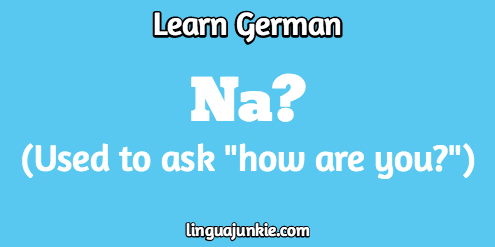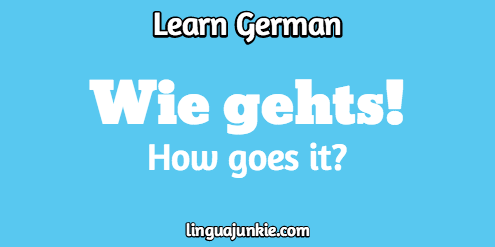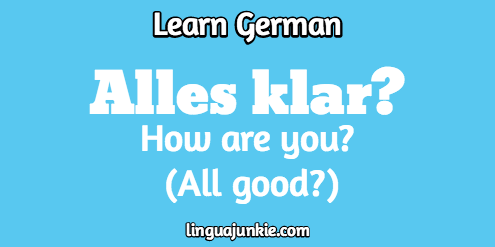
There are several ways to ask How are you in German.
You’ll going learn how to ask and how to answer this wonderful question. Read out them out loud to get a good idea of how the phrases sound in German. And in order to get the most value out of this quick lesson…
- Read this page to review and learn the phrases
- Both German & English translations are provided
- Print it out and keep it for extra review
✅ Hey, if you REALLY want to learn & speak German with a full learning system + 1,000s of Audio & Video lessons by teachers – Sign up at GermanPod101 (click here) and start learning! I recommend them as a teacher and a learner.
1. Wie geht es dir?
This is the first and most simple way to How are you in German. Except, it’s informal. This is in singular form and can be used on one person.
- Wie geht es dir? (informal)
- How are you? (informal)
2) Wie geht es Ihnen?
This is the more formal version of the above. Notice that “Dir,” meaning “You” has changed to “Ihnen.” This, unlike the version above, can be used for both – individuals and when addressing a group of people.
- Wie geht es Ihnen? (formal)
- How are you? (formal)
3) Wie geht es Ihnen heute?
Looks familiar to the first and second examples, right? The only difference here is we add “heute” meaning today. Just another variation to say How are you in German.
- Wie geht es Ihnen heute?
- How are you today?
4) Was macht die Arbeit?
Let’s try a variation. This time, we’ll be more specific and ask about work… or “Arbeit.”
- Was macht die Arbeit?
- How is work?
5) Wie geht’s?
How about something simpler?
- Wie geht’s?
- How’s it going
6) Wie geht es euch?
Another variation of “how are you” or “how are you doing?” However, this is an informal plural version so it’ll be useful when approaching a group.
- Wie geht es euch?
- How are you?
7) Was geht ab?
Whether you choose one or the other below, both versions mean “What’s up” in German.
- Was geht ab?
- Was geht?
- What’s up
 Na?
Na?
This one word has TONS of uses. If you’re a beginner, be careful and go the simple route without overwhelming yourself with more meanings. That’s worth it’s own lesson at another time.
- Na?
- How are you?
Tip: As a word, it’s meaningless. It’s HOW you say it that gives it meaning. And as thus, you can use it to greet people without formalities of saying “How are you” and to get answers.
9) Wie gehts!
Another friendly way of asking how one is.
- Wie gehts!
- How goes it?
10) Alles klar?
This is another super common question to ask “How are you doing” in German. Literally it means, “all right” or “everything good?”
- Alles klar?
- How are you?
And a super easy way to answer this would be to say the same thing back at them” “Alles klar,” meaning everything is alright. Or you can say “Ja, alles kar!” as in, “Yes, everything’s good!”
Now, here are some ways you can answer How are You in German. Just as it’s important for you to know the questions, you should know how to answer them as well. So, here are some common responses.
- I’m good, thank you, and you? (formal)
- Mir geht es gut, danke, und Ihnen?
- Good, thanks!
- Gut, danke.
- I’m fine.
- Mir geht es gut.
- I’m sick.
- Mir geht es schlecht.
- I’m not well.
- Mir geht es nicht gut.
- I’m really sick.
- Mir geht es wirklich schlecht.
- Alles klar
- Everything is alright.
Any phrases that I missed or that you want me to add to the list?
Let me know in the comments!
– The Main Junkie
P.S. I highly recommend this for German learners. If you REALLY want to learn to German with effective lessons by real teachers – Sign up for free at GermanPod101 (click here) and start learning!
“How are you?” is one of the phrases we use most often. Not a day goes by that we don’t ask this question. It’s polite. It’s customary. It’s what we do.
If you are someone who is learning German, you’ve probably wondered how to say how are you in German. Like in English, there are a couple of ways you can ask this question. Some are formal, some informal, and some are a bit out there. In this article, I will take you through these, explain how best to use them, and give you some helpful tips. Soon, you’ll be asking people how are you in German with the confidence of a native speaker.
Before you get started
Before you go out there and start asking people how they are, you need to know a couple of things about Germans and Germany.
The main one is that Germans ask others how they are way less often than we (English speakers) do. In the US and the UK, we often ask how are you as a way to start a conversation. It’s almost a part of saying hello. You greet someone; you ask them how they are; then you get on with the conversation.
It’s different in Germany. Over there, you mainly ask your friends how they are. Or people that you haven’t seen in a while. Rather than it being a small-talk starter, how are you is considered a genuine question by Germans.
The chances are that if you ask a German how they are, you will get a very honest answer. If you’re expecting them to say, I’m good, how are you? you’re in for a surprise. What you might get is closer to a personal essay about their messed up sleeping schedule and the new gardening tool they just bought.
Check out this short video by Radical Living if you want to see what you might unleash when you ask a German how they are. It’s both hilarious and 100% accurate.
Formal version of how are you in German – Wie geht es Ihnen?
This is the most common way to ask how are you in German. The sentence has both formal and informal versions – let’s start with the formal.
Wie geht es Ihnen? is a question you would ask in a formal setting. Think work, school, or bank. If you don’t know a person very well, this is the sentence you should go with.
Example:
- Guten Morgen, Frau Müller. Wie geht es Ihnen heute? (Good morning, Mrs. Müller. How are you today?)
Informal ways to say how are you in German
Wie geht es dir?
This is the informal version of Wie geht es Ihnen? It’s your standard way to ask how are you in German when you’re talking to your friends, classmates, co-workers, or family members.
Dir is the Dative version of du which is the pronoun you use in informal settings. In the previous example, we used Ihnen – the Dative version of Sie, used in formal situations. To learn more about German pronouns, check out our Complete Guide to Understanding German Pronouns.
Example:
- Hallo, Elias! Wie geht es dir? (Hello, Elias! How are you?)
Wie geht’s?
If you think that saying all of Wie geht es dir? is a bit of a mouthful, I’ve got good news! You can say Wie geht’s? instead. It’s a shorter, snappier, and slightly more informal way of asking your friend how they are.
As you can tell, the sentence starts the same – wie and geht are still used. Then, instead of saying all of es, you can shorten it to ‘s. Last but not least, you leave out the dir. Who needs it, right? I know you’re talking to me.
Example:
- Na, wie geht’s? (Hi, how are you?)
Difference between Wie geht es dir? and Wie geht’s?
If you’re wondering which one of the two you should be using, this section is for you.
It’s simple: You use Wie geht es dir? when talking to people that you are friendly with, but perhaps not the closest with. Think distant relatives or co-workers.
Wie geht’s? is used with your closest friends or your siblings.
There is not much difference between the two, but as a general rule, you can remember that the shorter the sentence, the less formal it is.
Wie läuft’s?
Wie geht’s? uses the word gehen, which means to go. If you’re looking for a fun alternative to that well-used phrase, you can use Wie läuft’s? instead. Laufen means to run – it’s similar to gehen but perhaps a bit more casual and playful. You could translate it to English as How you doing?
Wie ist die Lage?
This phrase is used mainly by younger people and is super informal and colloquial. It literally means: How is the situation? but a more accurate translation would be What’s up? or How is it going?
Wie schaut’s aus?
If you’re looking for a way to ask how are you in German without implying that you want an hour-long monologue about the other person’s life, this is the one for you. It literally means how is it looking, and you can expect it to be answered with a simple ok or a quick fill-in on what’s going on right now.
Na?
Finally, if you truly want to sound like a native speaker, this is how you can ask how are you in German slang. Na is a confusing word that has many meanings while also having no meaning at all. It can be used in different ways, including asking someone how they are. Be careful to only use this one in the most informal situations. Your boss would not appreciate you saying Na?
Now that you’ve learned how to ask the question, you also need to know how to answer it. Otherwise, you might get into an awkward situation when someone asks Und du? (And you?) and you just stare at them.
Mir geht es gut.
The most direct way to answer Wie geht es dir/Ihnen? What you’re doing here is replicating the sentence structure of the question and turning it into an answer.
- Wie geht es dir/Ihnen? → Mir geht es gut.
- How are you? → I’m good.
Careful! Do not say Ich bin gut. Even though it is a direct translation of I’m good, it has an entirely different meaning to Mir geht es gut. Ich bin gut implies that you’re good (at something) rather than that you’re feeling good. This is a common mistake many English speakers make, and it’s important that you avoid it. Always say Mir geht es gut.
Gut./Schlecht.
Instead of using an entire sentence to express yourself, you can keep it short and just use the adjective. Use gut when you’re feeling good, and schlecht when you’re in a bad mood.
Nicht schlecht.
This one means not bad. You can use it as a more neutral answer.
Es geht./Geht so.
If you’re not doing great, but it could be worse, you can go with one of these. They mean so so and are a bit more non-committal.
Other fun ways to ask how are you in German
Once you’ve mastered all the common ways to ask and answer the question, you might want to look into some of the more colloquial phrases that Germans use. Be warned: some of these make absolutely no sense!
Wie geht’s, wie steht’s?
When asking a German how they are, we use the word gehen (to go). So, why can’t we use stehen (to stand) as well?
This way of asking how are you in German is a lot of fun. First of all, it rhymes. Second of all, it’s super cheesy. It feels like a dad joke that went viral and never left the German vocabulary. It’s not the most common way to ask someone how they are, but if you’re in a particularly jovial mood, this is the phrase you might go for.
Alles im grünen Bereich?
If you’ve ever driven a car in Germany, you might be aware of their Emissions Sticker system. The good, less polluting cars get a green sticker, and the most polluting vehicles get a red one. Cars that fall in between get a yellow one.
This phrase references this system. There are low-emissions (or green) zones in Germany that only certain cars can enter. This way, those zones are kept healthier and less polluted. When you ask Alles im grünen Bereich? you’re literally asking if everything is in the green zone. That’s nice, isn’t it? Like you’re hoping that someone’s life isn’t too polluted. How very German!
Alles in Butter?
This one is my all-time favourite. It means Everything in butter? And who doesn’t love butter? Granted, this phrase makes a little less sense than all the other ones but at the same time… if you can ask someone how they are by referencing everyone’s favourite spread, why not just go for it?
To learn even more ridiculous ways to ask how are you in German, watch this video by DontTrustTheRabbit. Some of the ones she mentions involve things like stocks, art, and even bras.
Learn more
Knowing how to say how are you in German is great, but it’s also not enough to be fluent. Luckily, we have lots more posts to keep you occupied and help you learn some other common and useful German phrases. You can start with these:
- “Hello” in German: “Hallo!” and Other German Greetings
- How to Say Sorry in German – Apologies and Sympathies
- 10+ Ways to Say “You’re Welcome” in German
- “Thank You” in German and Other Expressions of Gratitude
These examples may contain rude words based on your search.
These examples may contain colloquial words based on your search.
Suggestions
Hallo, how are you? … Confidence.
How are you, sir? — I’m good.
How are you? — I couldn’t sleep. I was worried.
How are you? she says with concern in her voice.
How are you, little fellow? he asked in a soft voice.
How are you? — the girl gets in an incredibly huge amount.
How are you? I hope very well.
Medium — How are you and people around you over there? hope all is well.
Wie geht es Ihnen und Menschen um Sie herum da drüben? hoffe alles ist gut.
How are you? -I’m all right.
How are you? — Good, considering the circumstances.
How are you? — Very well, thanks.
How are you? Good, thanks.
How are you, Tom? — Good morning.
How are you, Sam? — Good.
How are you, James? Hello, René.
Description How Are You? has been developed for those who want to optimize life.
Beschreibung How Are You? wurde für Menschen entwickelt, die ihr Leben verbessern möchten.
Suggestions that contain How Are You
Results: 6928. Exact: 6928. Elapsed time: 1152 ms.
Documents
Corporate solutions
Conjugation
Synonyms
Grammar Check
Help & about
Word index: 1-300, 301-600, 601-900
Expression index: 1-400, 401-800, 801-1200
Phrase index: 1-400, 401-800, 801-1200
IN THIS POST
- How to Say ‘How Are You?’ in German [Formal & Informal]
- Wie geht es dir? [informal]
- Wie geht es euch? [informal]
- Wie geht es Ihnen? [formal]
- Wie geht’s?
- Wie geht es ihm / ihr?
- Alles gut bei dir? [informal]
- Alles klar?
- Wie läuft’s? [informal]
- Was geht ab? [informal]
- Was macht das Leben?
- Was gibt es Neues?
- How to Answer ‘How Are You?’ in German
There are many different ways to ask ‘how are you?’ in German, just like there are many ways to say hello or goodbye.
Asking someone how they are is probably the second thing you’ll say after meeting someone or starting a phone call with them. It’s normally reserved for someone you already know, rather than a first meeting.
Top tip: Be aware that when you ask a German speaker how they are, you will get a detailed answer. German speakers don’t ask this as an empty question without expecting an answer. They genuinely want to know how you are feeling. This differs to English where we often ask ‘how are you?’ and just expect a short answer.
After reading this post you will know:
- How to say ‘how are you?’ in German in both formal and informal situations
- How to ask how someone else is in German (a friend, parent etc.)
- How to respond if someone asks you ‘how are you?’
How to Say ‘How Are You?’ in German [Formal & Informal]
Before we dive right in, a quick note. Since German uses formal and informal speech, there are different ways to ask ‘how are you?’ depending on who we are talking to.
To help make these difference obvious, I’ve included [formal] and [informal] with each of the phrases so you know which is which. If there’s no note shown, the phrase can be used in both formal and informal situations.
Wie geht es dir? [informal]
- Translation: How’s it going for you?
- Meaning: How’s it going? / How are you?
The most common way to ask ‘how are you?’ in German. Wie geht es dir? is the informal version, so you can use this on anyone you would normally speak informally with; friends, family, younger people etc.
How to Respond
If someone asks you wie geht es dir? the correct way to respond would be to say:
| Es geht mir gut | (It goes for me good) | I’m fine / good |
| Es geht mir nicht so gut | (It goes for me not so good) | I’m not so good |
Top tip: Note that when asking ‘how are you?’ in German, the pronoun is in the dative case (mir, dir). Whenever you respond to this question, or bounce the question back to the other person, always make sure you are using the dative pronoun.
| German | Literal translation | Meaning |
|---|---|---|
| Hallo! Wie geht es dir? | Hello! How’s it going for you? | Hello! How are you? |
| Es geht mir gut, und dir? | It’s going well, and for you? | I’m good, and you? |
| Es geht mir auch gut, danke | It’s going ok for me too, thanks. | I’m fine too, thanks. |
Do you see how throughout this short conversation, the dative pronouns mir and dir are only used to respond or bounce the question around. They must always match each other. If someone uses the dative pronoun, you must also use it.
For example: ‘Wie geht es dir?’ ‘Gut, und du?’ In this case du is incorrect, because du is a nominative pronoun so it doesn’t match the dative pronoun.
It might help to think of it like this:
- When we say wie geht es dir? this literally translates as ‘how goes it for you?’
- If you then respond with gut, und du? you’re actually saying ‘good, and you?’
- This is correct in English but in German we have to ask how it’s going ‘for you‘
- So we have to say wie geht es dir? (how’s it going for you?) gut, und dir? (good and for you?)
More about how to answer ‘how are you?’ in German later…
Wie geht es euch? [informal]
- Translation: How’s it going for you guys?
- Meaning: How are you guys / all?
This version is basically the same as the previous, except we use it for groups of 2 or more people. Remember in German, we need to make the distinction between talking to one person, or a group of people. Wie geht es euch? is a bit like saying ‘how are you guys?’ This is the informal variation, as again you would use it for family and friends.
Wie geht es Ihnen? [formal]
- Translation: How’s it going for you?
- Meaning: How are you?
Can you see a pattern emerging? In this version, with swap the last word again to Ihnen. This changes the phrase to the formal version, so it can be used in more formal situations such as in a work environment. Wie geht es Ihnen? can be used for one or more people.
Wie geht’s?
- Translation: How goes it?
- Meaning: How’s it going?
All of the previous phrases can, and often are, shortened to wie geht’s? This is the shortened version of wie geht es [Ihnen / dir]?
Since there are no pronouns at the end of the phrase, neither formal (Ihnen) or informal (dir) we can say wie geht’s? to anyone we meet, even if you’re not sure whether you should use a formal or informal phrase.
Wie geht’s? works for both formal and informal situations so is a really useful phrase to remember.
Literally translated it means ‘how goes it?’ so you can see how we get ‘how’s it going?’ in English from this.
Wie geht es ihm / ihr?
- Translation: How’s it going for him / her?
- Meaning: How is he / she?
What if you want to ask the person you are talking to, about how another person is. For example, imagine you are talking to a friend whose mother is sick. You can ask them wie geht es ihr?
If you want to specify who you are asking about you can add the noun:
| Wie geht es deiner Mutter? [informal] | How’s your mother? |
| Wie geht es Ihrer Mutter? [formal] | How’s your mother? |
| Wie geht es Sandra? | How is Sandra? |
In these phrases we’ve used the possessive pronoun ‘your’ (how is your mother?) These also change depending on whether you’re speaking formally or informally: deiner Mutter (informal) and Ihrer Mutter (formal).
If the situation is reversed and someone asks you this, you can respond with:
| Wie geht es deinem Vater / deiner Mutter? | How is your father / mother? |
|---|---|
| Meinem Vater geht es gut | My father is fine |
| Meiner Mutter geht es nicht so gut | My mother is not so good |
| Es geht ihm gut | He is fine |
| Es geht ihr nicht so gut | She is not so good |
Note that we we still have to use the dative case when asking about how people are. So we say meinem Vater (my father), meiner Mutter (my mother), ihm (him) and ihr (her).
Alles gut bei dir? [informal]
Translation: Everything good with you?
This is another way of asking how someone is. ‘Everything good with you?’ Another nice, friendly phrase. This is often shortened to a simple alles gut? (everything good?)
This phrase use the informal dir, and although this can be changed to Ihnen to make it formal, the who phrase is quite a casual one, so you’re unlikely to use it formally.
Alles klar?
Translation: Everything ok?
Spend any amount of time in Germany and you’ll hear alles klar! It can be used as a statement to show you understand something. It can also be used as a question, alles klar? It’s a bit like saying ‘alright?’.
You’ll also hear alles klar bei dir? (everything ok with you?)
Wie läuft’s? [informal]
- Translation: How runs it?
- Meaning: How’s it going?
Meaning ‘how’s it going?’ this is another way to say wie geht’s? You can also add endings to this phrase such as wie läuft die Arbeit? (how is work going?) or wie läuft es in Berlin? (how’s it going in Berlin?)
Was geht ab? [informal]
Very colloquial phrase, roughly meaning ‘what’s up?’ It’s more of a ‘how’s it going?’ or ‘what’s going on?’ phrase rather than a ‘how are you?’
Use this one to really surprise your friends as it’s so colloquial they won’t expect you to say it!
Was macht das Leben?
- Translation: What makes the life?
- Meaning: How’s life?
Useful for someone you haven’t seen for a while, this is a good phrase for catching up with what’s going on in someone’s life. Used in the same way as in English.
Was gibt es Neues?
- Translation: What is there new?
- Meaning: What’s new?
Another casual phrase for catching up with a friend. ‘What’s new?’ Again, useful for finding out what someone has been up to if you haven’t seen them for a while.
So now you know how to ask how someone is, get prepared for answering the question yourself. There are endless ways to answer, just like in English, depending on how you’re feeling.
| Gut danke, und dir? [informal] | Good / find thanks, and you? |
| Mir geht’s gut, und Ihnen? [formal] | I’m doing well / I’m fine, and you? |
| Nicht schlecht | Not bad |
| Sehr gut | Very good |
| Ganz gut | Quite good |
| Mir geht es schlecht | I’m not well / I’m not great |
| Es geht so / geht so | So so (slightly negative, like you’re not feeling great but you want to sound like you’re ok) |
| So lala | So so (same as above) |
So now you know how to ask someone ‘how are you?’ in German. Have I missed any ways of asking or any responses? Let me know in a comment below.
How to Ask «How Are You?» and Answer It
12 words
How to Ask «How Are You?» and Answer It
12 words
Vielen Dank, aber ich habe dies nicht bestellt.
Thank you, but I didn’t order this.
Mir geht es gut, wie geht es dir?
I’m doing very well, how are you?
Vielen Dank für die Nachfrage.
Thank you for asking.
Wie ging es dir in letzter Zeit?
How have you been recently?
Mir geht es nicht schlecht.
I’m not bad.

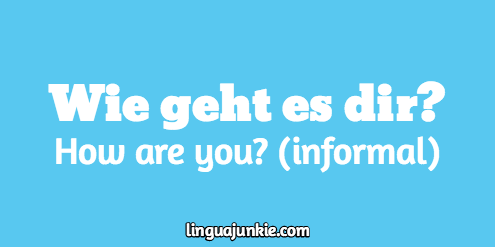
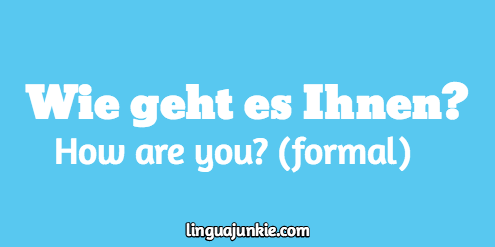
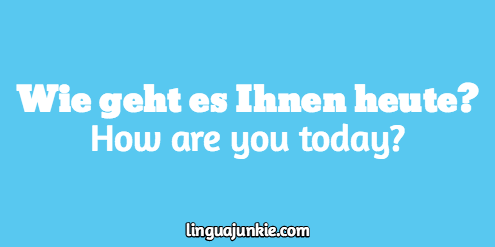
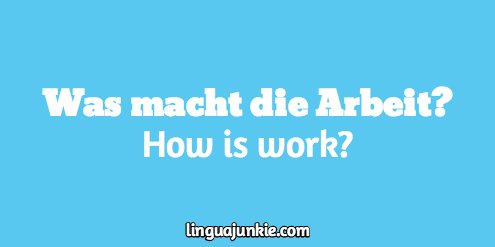
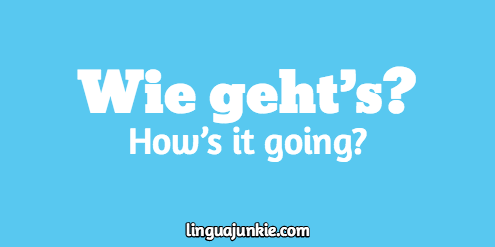
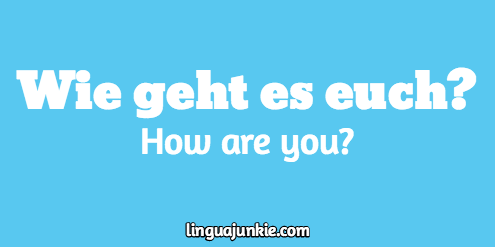
 Na?
Na?